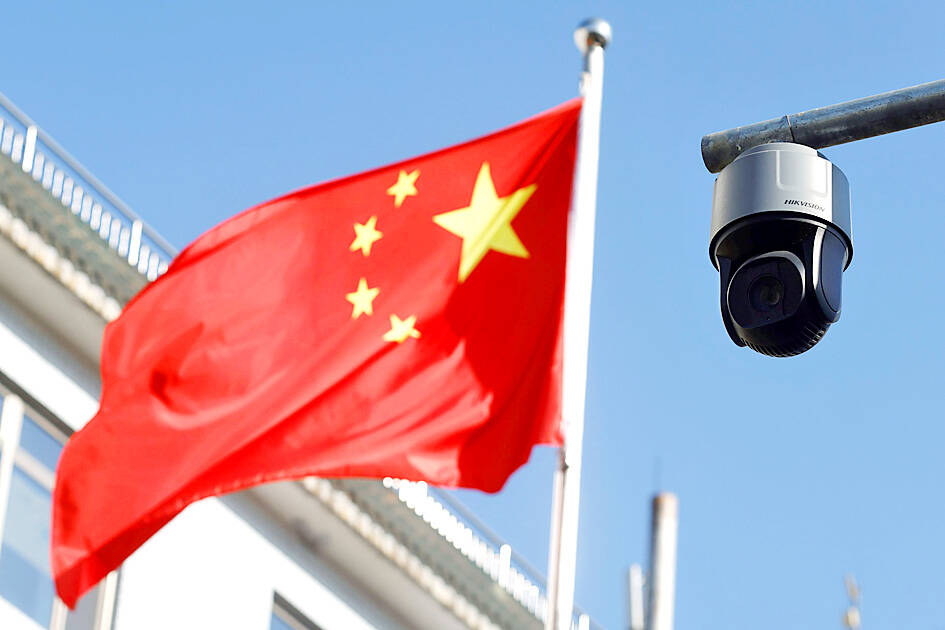Taiwanese who apply for a residence permit for China’s Fujian Province would be subject to “digital surveillance” by the Chinese Communist Party (CCP), a Taiwanese government official said yesterday.
Early last month, China’s Taiwan Affairs Office published a document outlining 21 measures to turn Fujian into a demonstration zone for relations with Taiwan.
The planned measures would expand favorable treatment for Taiwanese people and companies, and seek to convince Taiwanese to buy property and seek employment in Fujian. Taiwanese planning to live in Fujian to take advantage of the measures would be eligible for a residence permit.

Photo: Reuters
“The CCP has claimed that these residence permits would allow Taiwanese to enjoy the same benefits as Chinese nationals,” said the official, speaking on condition of anonymity. “However, the permits would make Taiwanese subject to the same digital monitoring that Chinese have increasingly been subject to since Beijing amended its counterespionage law.”
The CCP imposes surveillance through committees at different administrative levels, from provincial downward, they said.
“Recently, it added nine more of those committee members per borough, allowing it to monitor people in a more refined way — and these committees are increasingly using high-tech methods for surveillance,” the official said.
Committees paid by the CCP to monitor residents report the information they collect back to security officials at a provincial or national level, while the CCP uses propaganda to boost compliance from residents and discourage dissent, they said.
Chinese residence permits issued to Taiwanese use numbers that match the permit holder’s Taiwanese identification number, which is a violation of privacy and gives the CCP more control, the official said, adding that the measure could also make it harder for Taiwanese businesspeople operating in China to send money back to Taiwan or elsewhere.
“We have had reports from Taiwanese businesspeople who say that after they applied for residence in Fujian, Chinese officials collected information about their movements, their financial accounts and their purchases,” the official said.
“The CCP would know everything about those who apply for the permits, including even how much money they have in accounts overseas,” they added.
Applying for a Fujian residence permit would only make it easier for the CCP to monitor and arrest the permit holder, the official said.
“The CCP intends to create the illusion of exercising jurisdiction over Taiwan using international and Chinese domestic laws. Taiwanese should exercise caution when considering whether to apply for residence permits in China,” they said.

STILL COMMITTED: The US opposes any forced change to the ‘status quo’ in the Strait, but also does not seek conflict, US Secretary of State Marco Rubio said US President Donald Trump’s administration released US$5.3 billion in previously frozen foreign aid, including US$870 million in security exemptions for programs in Taiwan, a list of exemptions reviewed by Reuters showed. Trump ordered a 90-day pause on foreign aid shortly after taking office on Jan. 20, halting funding for everything from programs that fight starvation and deadly diseases to providing shelters for millions of displaced people across the globe. US Secretary of State Marco Rubio, who has said that all foreign assistance must align with Trump’s “America First” priorities, issued waivers late last month on military aid to Israel and Egypt, the

‘UNITED FRONT’ FRONTS: Barring contact with Huaqiao and Jinan universities is needed to stop China targeting Taiwanese students, the education minister said Taiwan has blacklisted two Chinese universities from conducting academic exchange programs in the nation after reports that the institutes are arms of Beijing’s United Front Work Department, Minister of Education Cheng Ying-yao (鄭英耀) said in an exclusive interview with the Chinese-language Liberty Times (the Taipei Times’ sister paper) published yesterday. China’s Huaqiao University in Xiamen and Quanzhou, as well as Jinan University in Guangzhou, which have 600 and 1,500 Taiwanese on their rolls respectively, are under direct control of the Chinese government’s political warfare branch, Cheng said, citing reports by national security officials. A comprehensive ban on Taiwanese institutions collaborating or

France’s nuclear-powered aircraft carrier and accompanying warships were in the Philippines yesterday after holding combat drills with Philippine forces in the disputed South China Sea in a show of firepower that would likely antagonize China. The Charles de Gaulle on Friday docked at Subic Bay, a former US naval base northwest of Manila, for a break after more than two months of deployment in the Indo-Pacific region. The French carrier engaged with security allies for contingency readiness and to promote regional security, including with Philippine forces, navy ships and fighter jets. They held anti-submarine warfare drills and aerial combat training on Friday in

COMBAT READINESS: The military is reviewing weaponry, personnel resources, and mobilization and recovery forces to adjust defense strategies, the defense minister said The military has released a photograph of Minister of National Defense Wellington Koo (顧立雄) appearing to sit beside a US general during the annual Han Kuang military exercises on Friday last week in a historic first. In the photo, Koo, who was presiding over the drills with high-level officers, appears to be sitting next to US Marine Corps Major General Jay Bargeron, the director of strategic planning and policy of the US Indo-Pacific Command, although only Bargeron’s name tag is visible in the seat as “J5 Maj General.” It is the first time the military has released a photo of an active